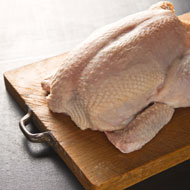Raw chicken linked to paralysing disease in dogs

Dogs that consumed raw chicken were found to be over 70 times more likely to develop APN.
Feeding dogs raw chicken meat could be linked to the rare paralysing condition, acute polyradiculoneuritis (APN), scientists have said.
APN is a debilitating disease that initially causes hind leg weakness, before progressing to the front legs, neck, head and face. Whilst dogs often recover in time without treatment, the disease can be fatal if paralysis spreads to the chest muscles.
It is the canine equivalent of Guillain-Barré syndrome (GBS) in humans. The bacteria Campylobacter - found in undercooked chicken, unpasteurised milk products and contaminated water - is now thought to be a trigger for GBS in up to 40 per cent of cases.
Scientists from the University of Melbourne’s U-Vet Werribee Animal Hospital wanted to find out if Campylobacter could also trigger APN in dogs.
The research team studied 27 dogs with APN symptoms and 47 without, examining physical symptoms and interviewing owners about recent behaviours and diet. Dogs that consumed raw chicken were found to be over 70 times more likely to develop APN.
Faecal samples were also collected within seven days of APN symptoms appearing. Lead author Dr Lorena Martinez-Anton said these were 9.4 times more likely to have had a Campylobacter infection than the control group.
“We predict that the microbe Campylobacter is likely to be the reason for the dysregulation of the dog’s immunity and therefore, the symptoms of paralysis,” she added.
“These bacteriological results were consistent with the hypothesis that the uncooked chicken meat was the source of the Campylobacter and as a result, triggered APN.”
Scientists also found a “significant association” between APN and smaller dog breeds. It is thought they may be more at risk as they are unable to eat larger bones, so owners tend to feed them more chicken necks.
Dr Martinez and chief investigator Dr Matthias le Chevoir, said the findings are concerning as there appears to be a growing trend for feeding dogs raw meat diets. They advised owners to feed “regular dog food” rather than chicken necks until more is known about APN.
The full paper is published in the Journal of Veterinary Internal Medicine.



 The Veterinary Medicines Directorate (VMD) is inviting applications from veterinary students to attend a one-week extramural studies (EMS) placement in July 2026.
The Veterinary Medicines Directorate (VMD) is inviting applications from veterinary students to attend a one-week extramural studies (EMS) placement in July 2026.